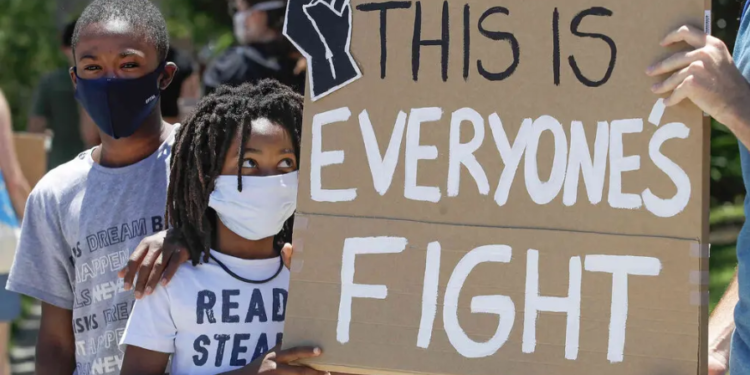Marcio Jose Sanchez/Associated Press
July 3, 2024 Story by: Editor
Summary
The article highlights clear evidence of racial discrimination against Black, Hispanic, and Asian Americans, impacting their economic prospects from childhood to adulthood. Key domains of discrimination include:
Access to Neighborhoods: Racial bias limits access to high-mobility neighborhoods, affecting long-term outcomes for minority children. Due to redlining and other discriminatory practices, minorities are more exposed to pollution and have less access to quality schools and hospitals.
Employment: Black and Hispanic workers face significant disparities in hiring, pay, and job stability compared to White workers. Correspondence studies reveal that resumes with African American or Hispanic names receive fewer callbacks.
Access to Capital: Minority households are more likely to be denied credit, impacting business ownership and wealth accumulation. Studies show that Black business owners receive fewer loans, even with similar profiles to their White counterparts.
The evidence shows that both implicit and explicit racial biases contribute significantly to these disparities. The article also emphasizes the need for race-conscious actions to address these inequalities and promote equal opportunities.
Rewritten Article
We present evidence showing clear discrimination against Black, Hispanic, and Asian Americans in various key domains, limiting their economic prospects from childhood through adulthood.
Evidence of Racial Bias in Access to Neighborhoods
A key determinant of economic well-being is the neighborhood one grows up in. Studies have shown that neighborhoods significantly influence long-term educational and economic outcomes (Chetty and Hendren 2018; Chyn and Katz 2021). These neighborhoods affect children’s access to clean water, high-performing schools, and job networks (Fee 2020). Research indicates that growing up in a high-mobility neighborhood, compared to a low-mobility one, can increase adult earnings by over 30 percent (Chetty et al., 2018). Discrimination limiting minority access to high-mobility neighborhoods restricts their opportunities for upward mobility.
Racial gaps in neighborhood traits and amenities are vast. Due to redlining, many people of color still live in areas near oil and gas wells and are more exposed to air pollution than White Americans. They are also less likely to have access to lead-free drinking water and hospitals. Evidence suggests that racial bias in neighborhood access affects outcomes for multiple generations. Chetty et al. (2020) found that predominantly White neighborhoods are three times more upwardly mobile than predominantly Black neighborhoods.
In 2022, there were over 33,000 fair housing complaints across the country. Sellers often refuse to sell to Black families. Studies using correspondence methods found that emails from non-White applicants receive slower and fewer responses. Carpusor and Loges (2006) found that African American and Arab names received significantly fewer positive responses than White names. Similar results were found by Hanson and Hawley (2011).
Audit studies, which send trained actors with near identical profiles, also reveal discrimination. A 2019 Newsday audit of Long Island house listings found discrimination against Asians, Hispanics, and Blacks. Discrimination included refusing listings or home tours to minority testers and directing them to different communities. Asian Americans and Pacific Islanders (AAPIs) were told about fewer available rental and sales properties compared to White applicants.
Recent studies show that these discriminatory behaviors block Black families from accessing quality neighborhoods, reinforcing segregation and income gaps. One study found that Black and Hispanic renters face discrimination in over 25,000 email interactions across the 50 largest US cities. Another study estimated that discrimination imposes damages of 3.5% to 4.4% of annual income for renters of color, with even higher damages for African Americans making above $100,000 per year.
Evidence of Racial Bias in Employment
Racial bias in employment affects economic well-being significantly. A Black worker in 2023 made about 12 percent less and was 2 percentage points less likely to be employed than a White worker with similar characteristics. Correspondence studies reveal that resumes with White-sounding names receive more callbacks than those with African American names. Kline et al. (2022) found a 9 percent lower callback rate for Black-sounding names. Meta-analyses show no change in discrimination against African Americans since 1989 but some decline against Latinos.
Audit studies found that minority applicants are less likely to receive job offers than White applicants with similar qualifications. Majority applicants received 53% more callbacks and 145% more job offers than minority applicants, leading to higher unemployment rates and lower pay for Black and Hispanic workers.
Evidence of Racial Bias in Access to Capital
Wealth is a robust measure of long-term economic well-being. Black and Hispanic households are more likely to be denied credit than White households. While gaps in business and home ownership have narrowed under President Biden, disparities remain. In 2022, only 6 percent of Black and Hispanic households owned a business compared to 9 percent of White households. Homeownership rates were also lower for Black and Hispanic households.
Audit studies found that Black business loan applicants were asked for more information and were less likely to be offered help or appointments compared to White applicants. During the Paycheck Protection Program (PPP), Black business owners were less likely to receive loans despite similar profiles. Automated processing of loan applications reduced racial gaps, indicating that human discretion contributes to bias.
Measuring Racial Bias
Studies use measures of implicit and explicit bias to understand discrimination. Research shows that areas with higher levels of racial bias have larger racial wage gaps, mortality gaps, and fewer loans for Black-owned businesses. Explicit bias includes public opinion questions, while implicit bias measures subconscious biases.
Conclusion
While progress has been made since the 1960s in reducing overt racism and racial gaps in income, wealth, and education, significant discrimination still exists. The evidence shows that racial biases, both implicit and explicit, impact various domains, necessitating continued remedial action. Race-conscious actions may be necessary to achieve true equality of opportunity for all Americans. Source: The White House

















